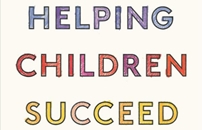 Help children by helping their parents
Help children by helping their parents
From an essay by Paul Tough author, most recently, of “Helping Children Succeed: What Works and Why” from which this is adapted.
"In 1986, in a few of the poorest neighborhoods in Kingston, Jamaica, a team of researchers from the University of the West Indies embarked on an experiment that has done a great deal, over time, to change our thinking about how to help children succeed, especially those living in poverty. Its message: Help children by supporting and coaching their parents.
"The researchers divided the families of 129 infants and toddlers into groups. The first group received hour long home visits once a week from a trained researcher who encouraged the parents to spend more time playing actively with their children: reading picture books, singing songs, playing peekaboo. A second group of children received a kilogram of a milk-based nutritional supplement each week. A control group received nothing. The interventions themselves ended after two years, but the researchers have followed the children ever since.
"The intervention that made the big difference in the children’s lives, as it turned out, wasn’t the added nutrition; it was the encouragement to the parents to play. The children whose parents were counseled to play more with them did better, throughout childhood, on tests of I.Q., aggressive behavior and self-control. Today, as adults, they earn an average of 25 percent more per year than the subjects whose parents didn’t receive home visits.
"The Jamaica experiment helps make the case that if we want to improve children’s opportunities for success, one of the most powerful potential levers for change is not the children themselves, but rather the attitudes, beliefs and behaviors of the adults who surround them.
"When parents get the support they need to create a warm, stable, nurturing environment at home, their children’s stress levels often go down, while their emotional stability and psychological resilience improve.
"Though interventions in the homes of infants and toddlers are especially effective, the principle that intervening with adults can help children seems to hold true in schools, as well. The Chicago School Readiness Project, a program developed by Cybele Raver, a psychologist at New York University, trains prekindergarten teachers in high-poverty neighborhoods in techniques intended to create a calm, consistent classroom experience for children: setting clear routines, redirecting negative behavior, helping students manage strong emotions.
"If from the beginning of the year the classroom is stable and reliable, with clear rules, consistent discipline, and greater emphasis on recognizing good behavior than on punishing bad, Dr. Raver believes that stressed-out students will be less likely to feel threatened and better able to regulate their less constructive impulses. That improved behavior, combined with the support and counsel of the mental-health professional assigned to the class, helps teachers stay calm and balanced in the face of the inevitable frustrations of teaching a group of high-energy 4-year-olds.
"The evidence from Dr. Raver’s experiments indicates that the program’s effects go well beyond classroom climate. The results of a recent randomized trial showed that children who spent their prekindergarten year in a Head Start classroom of the Chicago School Readiness Project had, at the end of the school year, substantially better attention skills, impulse control and performance on memory tasks than did children in a control group. They also had stronger vocabulary, letter-naming and math skills, despite the fact that the training provided to teachers included no academic content at all.
"The students improved academically for the simple reason that they were able to concentrate on what was being taught, without their attention being swept away by conflicts and anxieties. Changing the environment in the classroom made it easier for them to learn.
"Nurturing the healthy development of infants and children, whether in the home or in the classroom, is hard and often stressful work.
"What we now understand is that the stress that parents and teachers feel can in turn elevate the stress levels of the children in their care, in ways that can undermine the children’s mental health and intellectual development. The good news is that the process can be reversed, often with relatively simple and low-cost interventions.
"To help children living in poverty succeed, our best strategy may be to first help the adults in their lives."
-------
More about the book via Waterstones here
How can a church help?
Could parent and toddler groups be key here - not just in the building but also attendees helping other mums in the community?
There are resources to help parents play with children - see Parentplay and Parenting Puzzle from Family Links.
Then there are commercial franchises that a local Christian might want to run or you may want to invite an existing one into the community e.g. Creation Station, Jo Jingles, Monkey Music, Tumble Tots, Tatty Bumpkin. See more here. You could subsidise places for these sessions for those living in poverty.
Retweet about this article:
From an essay by Paul Tough, author, 08/06/2016